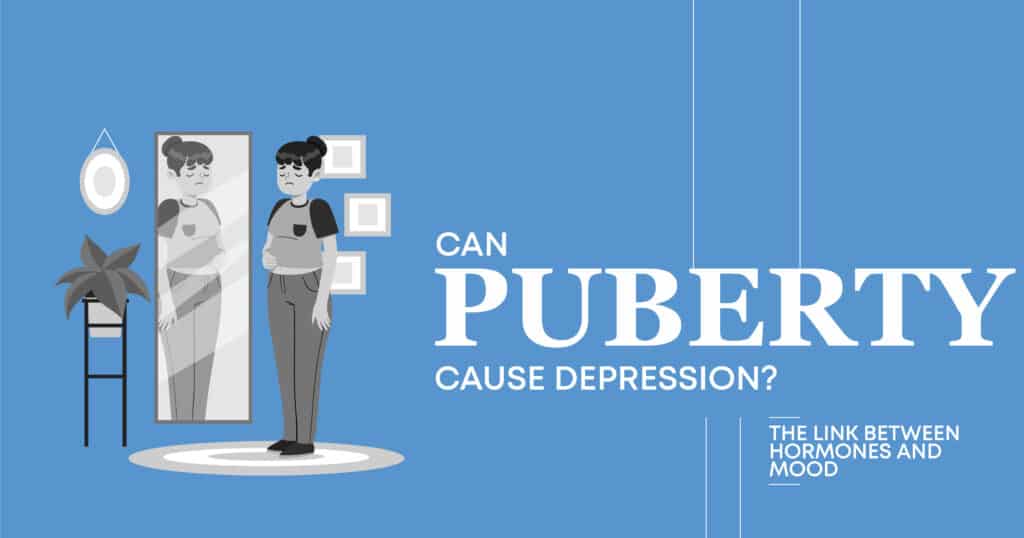Puberty can be intense. It’s a period where your body is changing so fast that it can feel like it’s out of your control. Your mind doesn’t exactly get a pass either. What most people don’t talk about enough is how puberty alters your mood, and not just your face or your height.
During puberty, hormones, like estrogen, progesterone, and testosterone, flood the system. They affect both your physical appearance and your brain. So when a teen starts acting withdrawn, irritable, or suddenly not like themselves, it’s not just “teen moodiness”. Sometimes it’s the beginning of something deeper, like depression.
When we really dig into the link between mood and hormones, it becomes clearer: these changes aren’t just physical. They can reshape how a young person feels, responds to stress, and even how they see themselves. So if you’ve ever wondered, “Can puberty cause depression?” The answer isn’t simple. But it’s definitely worth unpacking.
Can Puberty Cause Depression in Teens?
Yes, it absolutely can. It doesn’t happen to every teen, but puberty can act like a trigger for underlying mental health struggles. When puberty hits, it’s like the body is hitting fast-forward. Not just physically, but emotionally too. Everything is heightened.
This includes changes to:
- Thoughts
- Feelings
- Behavior
And when all of that shifts, a teen’s ability to handle daily life, emotions, and pressure can take a serious hit. One minute, they’re okay. The next? They’re spiraling, and they don’t even know why.
Some teens can bounce back quickly. But for others, the sadness lingers. It stops being “a bad mood” and becomes a weight. And when that happens, it can mess with:
- Sleep patterns
- Appetite
- Energy levels
- Self-worth
- Enjoyment of life
So, to circle back, does puberty cause depression? Not always directly. But it creates the perfect storm for depression to start.
What the Research and Real-Life Stories Reveal
You’d be surprised how many researchers have tried to figure out the connection between puberty and depression. And what they’ve uncovered matches what many parents and teens already feel in their bones.
| What Research and Real-Life Stories Reveal | Description |
| Research Says | Scientists have consistently found that puberty-related hormone shifts influence how teens manage emotions. Some teens become more vulnerable, prone to self-doubt, sadness, or even anger for no reason they can pinpoint. |
| Who is Most Affected? | Girls are statistically more at risk during and after puberty, though boys are by no means immune. Both genders face unique emotional and hormonal hurdles. |
| Real Life Stories | Families often report their teens becoming unrecognizable overnight, not in looks, but in spirit. A teen girl who loved reading now won’t touch a book. A boy who joked all the time is suddenly irritable or shut off. Parents are left wondering, “What happened to my kid?” |
These stories aren’t exaggerations. They reflect how deeply puberty can twist a teen’s internal world. One moment they’re full of life, the next they feel like they’re drowning in it.
The Role of Hormones in Teenage Mood Disorders
When puberty kicks off, hormone levels skyrocket. This usually involves shifts that the brain is still too young to fully manage.
Hormones like:
- Estrogen
- Progesterone
- Testosterone
They all impact how the brain handles emotion, stress, and fear. And the tricky part? The teenage brain isn’t done developing yet. So when these hormones come crashing in, the brain doesn’t always know how to keep up. You get big feelings, intense reactions, and in some cases, mood disorders like depression and anxiety.
What might’ve been just a sad moment turns into something they can’t shake off. A stressful day suddenly feels catastrophic.
When Anxiety Joins the Picture: Puberty and Emotional Overload
During puberty, an overwhelming feeling of not being in control is very common. So, because of this, can puberty cause anxiety? Without question. And when anxiety shows up, it often comes with depression. You start feeling anxious, then sad about being anxious.
Throw in academic stress, body image worries, and social drama, and you’ve got a brain that’s basically on fire all the time. Every small thing feels huge. And without help, teens can start to drown emotionally.
Female Puberty and Depression: What Makes It Unique?
Now let’s focus on puberty in girls because the way female puberty onset plays into depression is different. More complicated.
Studies show that girls are more likely to develop depression around puberty. Why? It’s partly because of how hormones interact with female brains. When estrogen and progesterone spike fast, emotions can feel way too big, way too fast.
| Hormones | How They Affect Mood and Depression Risk |
| Estrogen | During puberty, estrogen levels increase. This heightens stress sensitivity and changes how emotions like fear and sadness are processed. This can push some girls closer to depression. |
| Progesterone | Higher progesterone can mess with how the brain controls emotions, causing more frequent irritability, crying, or anxious thoughts |
So, can female puberty onset cause depression? It can. And knowing that matters. It helps parents and teens approach puberty with less confusion and more compassion.
Early Signs of Depression During Puberty
Spotting depression early during puberty can really change things. But here’s the hard part: a lot of signs look like “typical teenage behavior.” Which means they’re easy to miss or dismiss.
Here are the signs that shouldn’t be ignored:
| Signs Of Depression | Description |
| Changes in Mood | Sadness that doesn’t go away. Feeling empty. Quick to anger or just numb. |
| Loss of Interest | Suddenly dropping hobbies, ignoring friends or family, or seeming detached from everything. |
| Tiredness | Exhaustion all the time even after a full night of sleep. |
| Academic Decline | Grades slipping. Difficulty concentrating. Zoning out more often. |
| Change in Sleep Pattern | Either sleeping way too much or struggling to sleep at all. |
| Changes in Appetite and Weight | Eating way more or far less, leading to noticeable weight gain or loss. |
Sure, bad days are normal. But when those days stretch into weeks and your teen isn’t bouncing back? That’s the red flag. And that’s when you need to ask, is this more than just puberty?
How Parents and Caregivers Can Offer Support
Teens might act like they don’t want your help, but deep down, they do. Your role isn’t to fix everything. It’s to show up consistently.
Here’s what you can do:
| How To Help | Description |
| Listen Without Judgment | Don’t rush in with advice. Just be there. Let them talk. That alone can make them feel safer. |
| Keep Communication Open | Check in casually. Ask how their day was. Keep the door open without being pushy. |
| Watch Out For Signs | Pay attention to mood, sleep, appetite. If your gut says something’s off, trust it. |
| Know When To Seek Professional Help | If things aren’t improving, don’t wait. A therapist or counselor can make a world of difference. |
Teens want to know someone’s in their corner, even if they pretend not to care. Showing them you’re paying attention can be a lifeline.
Worried About Your Teen’s Mental Health? Hillside Horizon for Teens Is Here to Help
It’s terrifying watching your child struggle with sadness or anxiety and feeling like you can’t fix it. You don’t have to handle it alone. There’s help. And sometimes, getting help is the strongest, bravest move you can make for your child.
If you’re wondering whether what your teen is going through is related to puberty or something deeper, like depression, get advice from a professional.
At Hillside Horizon for Teens, we specialize in walking families through moments just like this. We understand how scary it can be. Our team of mental health professionals creates a space where teens aren’t judged, rushed, or dismissed. They’re heard, respected, and gently guided toward healing.
We don’t believe in one-size-fits-all plans either. Every teen, every family is different. So we work closely with you to build a personalized treatment plan that addresses your child’s specific needs.
Healing is possible. Your child’s mental health matters. And sometimes, reaching out for help is the greatest gift you can give them, and yourself. Don’t wait. If you’re worried, contact Hillside Horizon for Teens today.
FAQs
Does puberty cause depression?
Not exactly, but the emotional chaos and brain changes happening during puberty can make teens way more vulnerable to it.
Why do hormonal changes affect mood?
Hormones like estrogen, progesterone, and testosterone disrupt the chemicals in the brain that control emotions. They heighten the feeling of sadness, fear, and anger.
Can puberty trigger anxiety in teens?
Yes. It can. The same emotional shifts that bring on depression can also crank up fear and worry, especially around school, friendships, or body image.
What are the signs of depression during puberty?
Signs include sadness that doesn’t go away, withdrawing from friends, exhaustion, changes in appetite, and trouble sleeping.
How can parents help a teen struggling with mood changes?
Be there. Listen without judgment and check in often. Watch for subtle shifts in behavior. And when it feels bigger than you can handle? Bring in a professional. Early help makes a world of difference.




